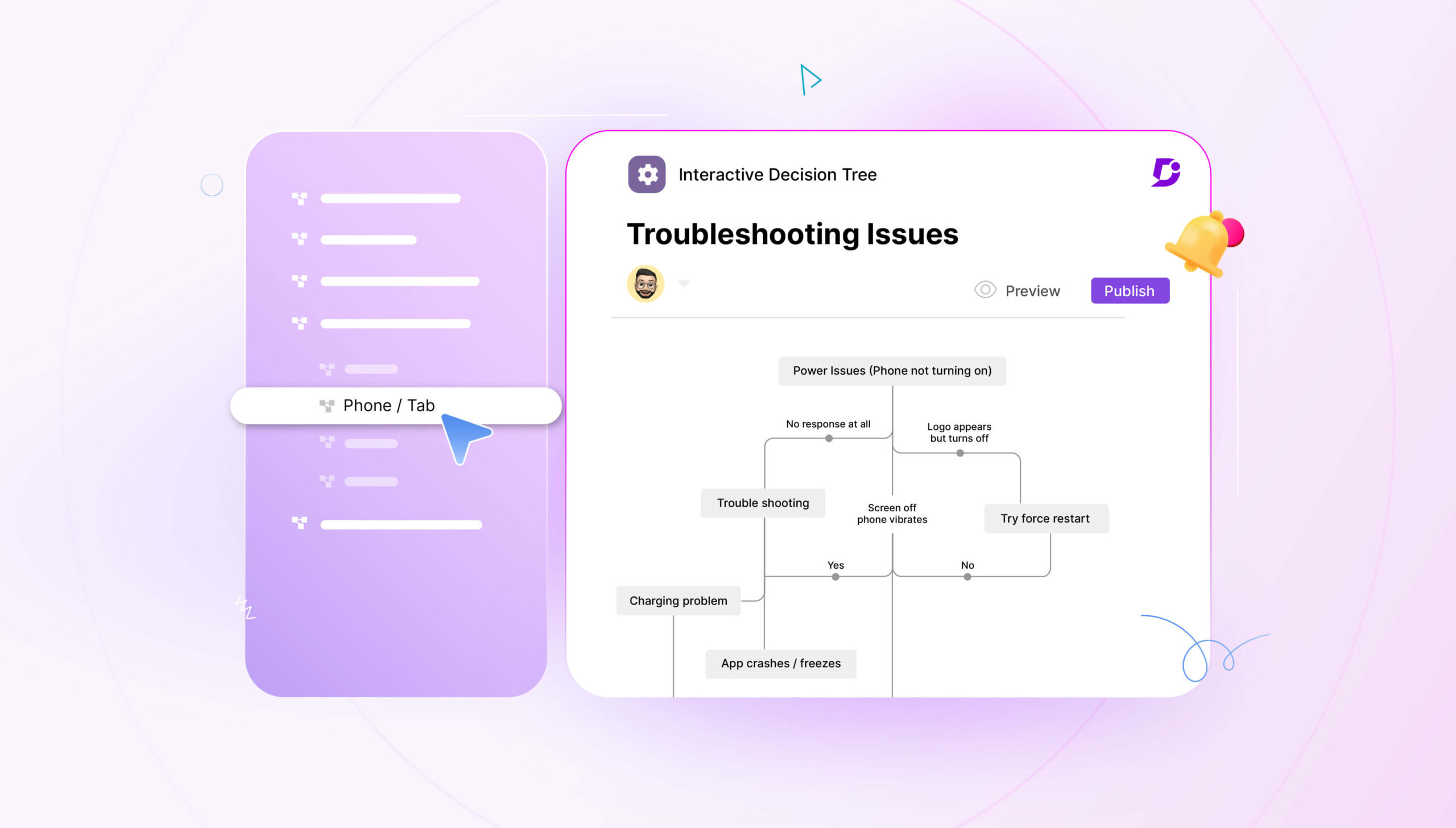The question of where and how to host your knowledge base is an important concern for companies who want to optimize their content delivery for their customers or internal users. Documentation needs to be properly handled if it is to reach maximum effectiveness and scalability. Although hosting might not be visible to your users, it affects how you handle your knowledge base and content and impacts potential workflows and resource allocation.
When investing in SaaS knowledge base solutions, organizations are concerned with how the vendor will host their site and what implications this may have for access, security, etc. There are a few different options available for hosting, including on-premise and private hosting, each with unique benefits and drawbacks.
You’ll want to consider this question carefully because both businesses and their customers have different requirements for hosting their knowledge base.If companies are used to managing their resources in-house, for example, they might find it challenging to switch to a SaaS knowledge base to hand control over to their provider. How you host your knowledge base has important repercussions for issues like security, data control, access, and more.
What is an On-Premise Knowledge Base?
Some companies are interested in an on-premise knowledge base (also known as self-hosted) because it is hosted on their internal network. Organizations with the resources to self-host the knowledge base can host the site on their own servers rather than relying on remote private servers or the cloud.
Think of it this way. You can download the Software once, host it yourself and pay the perpetual license fee instead of being locked into recurring license fees. If you choose this option, you are responsible for maintaining the Software and keeping up to date with all relevant security requirements.
It appeals to businesses because you can technically own the Software versus paying for access over time. Some software vendors license their Software to be installed on on-premise servers of their customers – it’s a difference in how vendors make their Software available. Companies with their own internal IT teams often choose on-premise installations, and knowledge bases are no exception. Sometimes, you can pay an annual fee to receive support, maintenance, and updates.
Instead of accessing the Software over the internet in a SaaS model, organizations download the Software and access it locally. Data is stored in-house, and anyone in your network can use the knowledge base.
Pros & Cons of On-Premise Knowledge Bases
Choosing an on-premise knowledge base naturally has advantages over choosing Software as a Service. Companies may be looking for solutions that allow you to access the Software through an on-premise model. Businesses with the resources to host on-premise can enjoy the following benefits and disadvantages.
Pros:
Here are some of the pros of hosting an on-premise solution.
Higher Level of Security & Privacy
When your knowledge base is hosted on your own local networks, it is much less vulnerable to attack risk. Because the knowledge base is only accessible by internal users, there are fewer chances for security breaches, and you can easily control who has access.
Advanced Features & Flexible Customization Options
When you download and own the code, you make available advanced features and flexible customization options. You can modify the source code to suit your own needs and even build features you would ideally like to have, as long as you work within the terms of the license agreement.
Upfront Costs
With on-premise hosting, you don’t have to pay anything except the initial license fee as long as you already have access to your own servers and IT team. If you already have these resources to spare, this can make an on-premise knowledge base a cost-effective investment since you know precisely what you have to pay.
Data Control
With an on-premise knowledge base, you have control of your data so you don’t have to worry about what an external party might do with it. You can provide the necessary reassurance to your customers or clients that their data is secure and you’re confident in managing it.
Offline Access
If you need to access your knowledge base offline, on-premise hosting is the way to go since it’s available on your internal network. If you suffer from limited connectivity or poor network speeds, on-premise solutions can be accessed locally and bypass these problems.
Cons:
However, there are many cons you should be aware of for the on-premise hosting option for your knowledge base.
Long-Term Costs and Ongoing Maintenance Fees
Although hosting your knowledge base on-premise might seem alluring initially due to potential cost-savings, ongoing maintenance fees, and other long-term costs soon begin to eat up your budget. Maintenance and upgrades of physical hardware can be prohibitive compared to with the benefits of outsourcing this job to a cloud provider.
Limitations on Scalability or Expansion Plans
If you want to scale or expand, you must invest in more hardware, which can be costly and lengthy. Scaling up or down is more challenging when you are hosting your Software since you rely on your existing resources. There’s also the question of having the physical space to store your servers.
No Access for Remote Teams
When you host your knowledge base on-premise, it will be difficult to give access to remote teams, which poses a problem for globally distributed companies. Users will need to be able to connect to the local network rather than logging into the Software through the cloud as you would with a SaaS solution.
Data Loss Risk at System Failure
If you are hosting your data and Software on-premise, you risk data loss if the system goes down. Without backing your data up in the cloud, vital data could be deleted without the possibility of recovery, which undermines the purpose of having a knowledge base in the first place.
Interested in Document360 Knowledge base? Schedule a demo with one of our experts

Private Hosting: A Good Alternative to an On-Premise Solution
A great alternative to on-premise hosting is private hosting for your knowledge base. Our own knowledge base solution, Document360, offers private hosting for our customers who require the added benefits of outsourcing this aspect of your operations.
Private hosting in the cloud is when you have your own dedicated cloud server, using resources that are not shared with other customers. You have all the advantages of a cloud hosting server with fewer downsides since you can customize resources for your workloads and deliver content faster to your customers with low latency.
Many enterprises choose Document360 because they need to offer their clients and customers the advantage of private hosting. They want to access a SaaS knowledge base without the negative effect of multiple parties sharing the same resources, which could impact performance. The benefits of the privately hosted model mean that Document360 has yet to find it necessary to offer an on-premise solution since private hosting is more than sufficient for the needs of our customers.
Advantages of Document360’s Private Hosting Option
Document360 offers some significant advantages regarding private hosting for your knowledge base.
Data Control
Document360’s private hosting option gives you absolute control over your data. You can choose to host your knowledge base in any part of the world where Microsoft Azure data centers are available and so comply with data sovereignty requirements. Furthermore, granular data control means you can meet your customers’ needs while benefiting from SaaS knowledge base software.
Customization
You can customize the resources for your workloads, meaning that you can benefit from various infrastructure vendors. We recognize that our enterprise customers have a range of requirements, so we don’t adopt a one-size-fits-all approach. If you choose Document360, you can speak to our team about how you would like your knowledge base to be hosted.
Access for Remote Teams
When you host your knowledge base privately with Document360, it can be accessed securely by teams based anywhere in the world. Never worry about security breaches with enterprise Single Sign-on (SSO) features such as SAML, OpenID, and JSON Web Token (JWT) methods. Remote access for teams is infinitely preferable for companies who don’t want to be limited to their own private network.
Scalability
No matter how many resources you require, you can scale your knowledge base up and down with Document360 private hosting. Optimal performance and smoother day-to-day operations are possible with an exclusive and dedicated environment for your organization, eliminating the need to invest in costly hardware to scale.
Cost-Saving on Infrastructure and Maintenance
With private hosting, you outsource the cost of infrastructure and maintenance, which results in significant cost savings as the vendor can run these processes more effectively. In contrast to on-premise hosting, you don’t have to pay the price for running the Software on your own servers since Document360 takes care of this for you.
Disaster Recovery
In the worst-case scenario that the Software goes down, the systems we use to host the Software and data are thoroughly backed up for disaster recovery. We always save a version of your knowledge base so you can revert to it in case of an unforeseen data loss, reducing the likelihood of impact on your productivity.
Maximum Performance
Deliver your documentation content at lightning speed to your customers with Document360. Speed enables you to improve customer satisfaction and assist with support ticket deflection. Since you are not sharing the hosting resources with other customers, Document360 can serve content to your customers much faster and ensure they instantly have access to the information they need.
Private Hosting Vs. On-Premise Server
Private hosting and on-premise servers confer some of the same advantages. For one, they both enable companies to benefit from dedicated resources that improve the performance and availability of their knowledge base. Both enable more control of the data and assurances over where it is stored.
That’s where the similarities end. With on-premise hosting, you must have access to an on-call IT department to maintain your servers and Software at all times. You might spend more time managing Software than you do delivering and publishing content for the benefit of your users. Private hosting means all this is taken care of.
In private hosting, your knowledge base is as secure as an on-premise solution because end-to-end encryption protects you against cyber attacks. You have all the advantages of accessing your resources through the cloud with no drawbacks that enterprises may worry about.
Document360 allows you to deliver your documentation content faster to your customer base using dedicated geographically located content networks with low latency, a feature you would not get with on-premise Software. Private hosting focuses on performance and ensuring you create the best customer experiences.
Wrap up
Many companies rightly want more control over the hosting of their knowledge base. With concerns about security, back-ups, and data control, we hope to have shown how Document360’s private hosting option for your knowledge base offers some significant advantages over hosting your knowledge base on-premise. The effort and cost involved in on-premise solutions are not worth it for companies wanting to remain competitive.
With Document360, you have absolute control over how your knowledge base is hosted, which is vital for the enterprise. You can scale up and down as needed and don’t have to worry about maintaining hardware. We do all the hard work for you so you can benefit from private hosting and focus on creating content.
Document360 adheres to stringent organizational data security policies for companies with added security concerns to enable you to comply with customers’ requirements.




 –
– 

